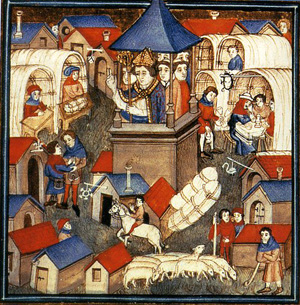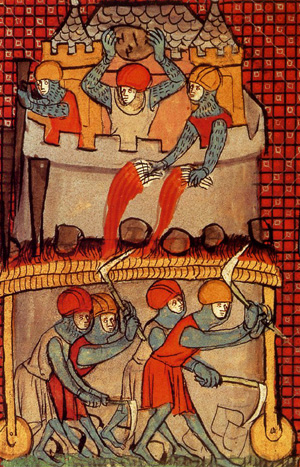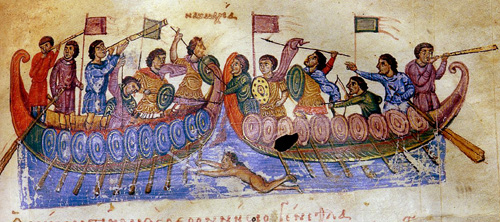In the last article, we saw how feudalism formed independent of the King. Essentially speaking, however, the King was not affected by this development. He continued to be the symbol of the supreme power. He also maintained, in principle, the power to govern that great organic whole of autonomous regions and cities, which at the time constituted the nation.

The medieval city developed in competition with feudalism |
Even when the King was relatively powerless during that period of fecund disarticulation that encouraged the rise of feudalism, he continued to represent a great deal as a symbol, a reminder of the past and a hope for the future.
Charlemagne wanted to unite Europe under a single Emperor who would rule over all the various kingdoms. The Emperor would be a kind of Rex Regum, King of Kings, who would unify the Catholic kingdoms to present a single front against foreign enemies. This was also the desire of the Popes – to establish an imperial power that could lead all of Europe.
This plan was not realized because of the indifference and lack of discipline of the medieval Princes, who on many occasions did not live up to the principles they represented. If they would have respected the dignity of the Emperor and the plan of the Holy See to make one empire of all Christendom, History would be different.
Under the Emperor would be Kings, such as under the Empire created by Bismarck. There were the Kings of Prussia, Bavaria, Wurtemberg and Saxony, along with other less important sovereign Princes. This model realized in Germany in the 19th century under Protestant and Masonic inspiration was, in fact, the plan of the Papacy to be realized earlier under a much different spirit by all the European peoples around the Catholic Emperor.

Charlemagne's plan was to unite the Medieval Kings under one Empire |
If this would have come to pass after Charlemagne, the Crusades would have benefited from a unity of command, which would have given them a much greater facility to win and maintain the victories. The sad side of the Crusades constitutes the internal rivalries among Catholics that arose because of the lack of obedience to a supreme political authority.
The second Crusade, for example, ended practically before the fight against the Muslims began because the King of France quarreled with the King of England. This could have been avoided if an imperial authority, following that initial plan of the Popes, had been ruling. As a consequence, the Muslims would have been pushed back beyond Pakistan, and North Africa and the Holy Land would have been free of their presence. The map of the world would be different, and today the Sepulcher of Our Lord Jesus Christ would not be in the hands of infidels.
The feudal wars
Many historians see dangerous intrinsic factors of disunion in European feudalism, the autonomy of the various regions, and its correspondent conception of property. However, experience has shown that autonomy in itself is not a factor of disunion. For example, no one of good sense sees factors of disunion in the autonomy of the federative republics of the three Americas. On the contrary, such autonomy propitiates agile, practical and fecund relationships among regions and States, which reflects an intelligent understanding of the political-social reality.
Regionalism does not automatically lead to hostility among the parts, or hostility between the parts and the whole. Regionalism stimulates a harmonic autonomy that allows the people to share the riches of the spiritual and material goods common to all regions, as well as to enjoy those characteristic of their own particular region.
Why do historians think that feudalism gives rises to disunity? If one considers the European States before the French Revolution and compares them with the medieval States, it appears that there were fewer internal wars in the former than the latter. Then, those historians ask: What factor existed in the Middle Ages that ceased to exist by the time of the Ancien Regime? Their answer is: Feudalism and regionalism.

Although wars were many in the medieval period, they were mostly small-scale affairs with few casualities |
Thus, they deduce that feudalism and regionalism are the causes for those many internal wars and quarrels of the Middle Ages. Consequently, they judge that the autonomy of those multiple regions and states should be done away with. To replace them, a single strong central government should be established, the Modern State that abides no interference in its government of the whole.
This is very simplistic reasoning.
In the Middle Ages, a different factor was responsible for the danger of disunity.
Certain peoples, like the post-communist Slavs, have the vice of doing as little as possible; they prefer to live in laziness. One can see that they acquired this vice under Communism, and after some independence was given to them, they did not want to abandon it. They prefer to live even in misery rather than shake off their far niente [doing nothing].
For other peoples, to wage war can easily become a vice. We see this, for example, with many Indian tribes. One tribe habitually wages war against another. Is it a question of borders that they are fighting for? No, because among the Indians there are no fixed borders in the forests. Many of these tribes are nomads, yet they wage war as much as the others. It is not a matter of property or borders. They wage war because they have the bad custom to do so. For them to wage war is enjoyable, just as the Slavs enjoy doing nothing. They love to go to war.
Such pleasure for war, which is abhorred in our pacifistic modern times, was also a habit among the pre-medieval barbarians at the time of the Romans. They loved to be always quarreling among themselves and waging war.
Then, when they encountered the Romans, they started to wage war against them. After the Romans of the West were defeated, these German barbarians became more or less the lords of Europe. They continued their wars because of their habit of waging war. This is the origin of the eternal medieval quarrel. The German barbarians had already begun to be tamed insofar as the influence of the Church grew and created the desire for a Catholic peace: The peace of Christ in the Reign of Christ, as defined by St. Augustine.
The historians do not want to take this factor into consideration. They prefer to blame feudalism and regionalism as the cause for the many medieval wars. This judgment, however, lacks objectivity and favors a revolutionary centralization of power.

A Taste for Fighting - In this 11th century illustration of a naval battle, two crews fight it out hand to hand, encouraged by military musicians |

Posted September 24, 2007

  | | Prof. Plinio |
Organic Society was a theme dear to the late Prof. Plinio Corrêa de Oliveira. He addressed this topic on countless occasions during his life - at times in lectures for the formation of his disciples, at times in meetings with friends who gathered to study the social aspects and history of Christendom, at times just in passing.
Atila S. Guimarães selected excerpts of these lectures and conversations from the trancripts of tapes and his own personal notes. He translated and adapted them into articles for the TIA website. In these texts fidelity to the original ideas and words is kept as much as possible.

Related Topics of Interest
 The Personality of Charlemagne The Personality of Charlemagne
 Vocations of the European Peoples Vocations of the European Peoples
 The Organic Formation of Feudalism The Organic Formation of Feudalism
 Overview: Revolution and Counter-Revolution Overview: Revolution and Counter-Revolution
 What is Organic Society? What is Organic Society?
 The Decline of Feudalism and Growth of the Modern State The Decline of Feudalism and Growth of the Modern State
 Departure for the Crusade: A Desire for Sublimity Departure for the Crusade: A Desire for Sublimity
 Groups of Friends and Guilds Groups of Friends and Guilds

|
